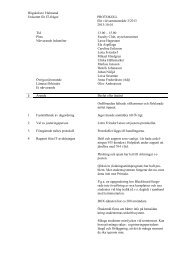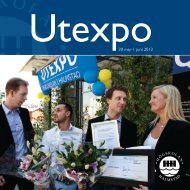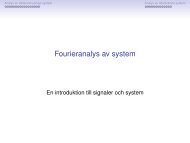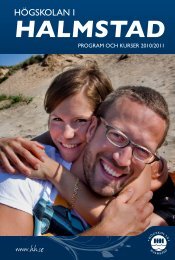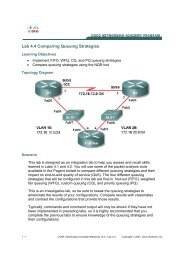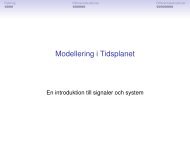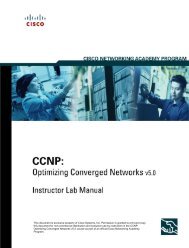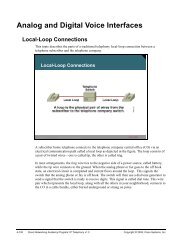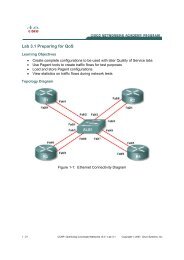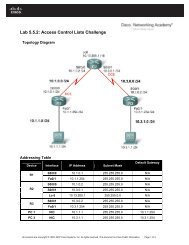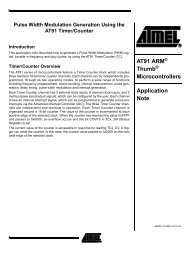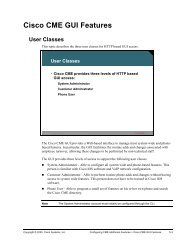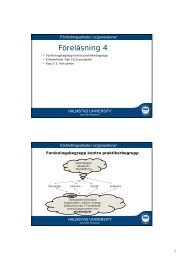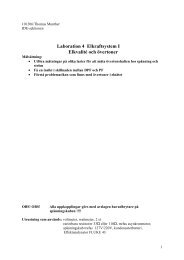ANNUAL REPORT 2012
ANNUAL REPORT 2012
ANNUAL REPORT 2012
You also want an ePaper? Increase the reach of your titles
YUMPU automatically turns print PDFs into web optimized ePapers that Google loves.
Acumen+: Core Enabling Technology for Acumen<br />
Acumen+: Core Enabling Technology for Acumen<br />
Walid Taha, Veronica Gaspes, Jerker Bengtsson<br />
Centre for Research on Embedded Systems (CERES),<br />
Halmstad University, Halmstad, Sweden.<br />
Introduction<br />
We are developing a modeling and simulation language design<br />
called Acumen around the thesis that, for a variety of reasons<br />
mathematics is the right formalism for describing many cyberphysical<br />
systems. Two key hypotheses underlying this thesis are<br />
that<br />
• Precise modeling is essential for meaningful experimentation,<br />
analysis, and verification and<br />
• Mathematical models are more amenable to parallel simulation<br />
than efficient codes.<br />
For the Acumen research program to take off, and to develop<br />
more traditional research funding proposals, attaining some<br />
preliminary results along these two dimensions is of crucial importance.<br />
To this end, we propose a two year activity that will<br />
develop Acumen along two dimensions that will allow us to<br />
accumulate a wide range of preliminary results that would form<br />
a solid basis for pursuing funding from a wide range of sources<br />
beyond CERES and the KK foundation. The proposed project<br />
also includes a component on developing international connections<br />
both in terms of software development and in terms<br />
of teaching a course on the results of the project internationally.<br />
[1]<br />
[2]<br />
[3]<br />
[4]<br />
[5)<br />
[6]<br />
[7)<br />
References<br />
The Acumen Distribution at www.acumen-language.org.<br />
Mathematical Equations as Executable Models, Yun Zhu,<br />
Edwin Westbrook, Jun Inoue, Alexandre Chapoutot,<br />
Cherif Salama, Marisa Peralta, Travis Martin, Walid Taha,<br />
Marcia O’Malley, Robert Cartwright, Aaron Ames, Raktim<br />
Bhattacharya, The First International ACM/IEE Conference<br />
on Cyber Physical Systems (ICCPS’10), Stockholm,<br />
2010.<br />
In Pursuit of Real Answers, Angela Yun Zhu, Walid Taha,<br />
Robert Cartwright, Matthieu Martel, Jeremy G. Siek, International<br />
Conference on Embedded Software and Systems<br />
(ICESS’09), Hangzhou, 2009.<br />
“Globally Parallel, Locally Sequential”, Paul Brauner and<br />
Walid Taha, International Workshop on Parallel/High-<br />
Performance Object-Oriented Scientific Computing (PO-<br />
OSC'10), Las Vegas, 2010.<br />
Differential dynamic logic for hybrid systems, Andre<br />
Platzer, Journal of Automated Reasoning, 2008 - Springer.<br />
The Ambric, Wikipedia Article.<br />
A new representation for exact real numbers, A Edalat,<br />
Electronic Notes in Theoretical Computer Science, 1997<br />
- Elsevier.<br />
Research Questions<br />
The overarching question behind this research is whether simulation<br />
technologies can be relied on for early experimentation<br />
with novel designs of embedded and cooperative systems. This<br />
general question gives rise to important technical questions,<br />
including:<br />
• Are there effective and efficient methods for detecting numerical<br />
precision errors?<br />
• Are there ways to effectively and efficiently compute with<br />
variable precision representations?<br />
• Are there ways to unify the diverse methods available from<br />
numerical computation, starting from integration to more<br />
sophisticated operations?<br />
CERES Annual Report <strong>2012</strong><br />
27



